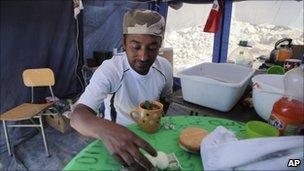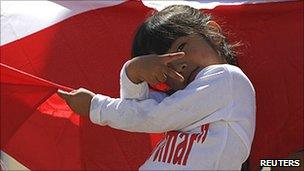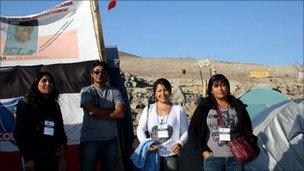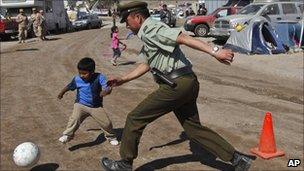Trapped Chilean miners: Family's diary
- Published
The 33 miners trapped deep underground in northern Chile for more than two months have now been rescued.
Miner Omar Reygadas: "I am a new man, and I think I've been born again"
Omar Reygadas was the seventeenth to be freed in an operation that drew the world's attention. Mr Reygadas, 56 is a heavy equipment operator who has been a miner all his working life.
His children Omar, Ximena and Marcela kept a diary for the BBC, describing their long wait to see their father again.
15 OCTOBER
Omar: I just left the hospital and I'm waiting to hear if my Dad will be discharged today.
He had an operation because he had some problems with his teeth. The doctors need to do some checks to determine if he can go home.
The first thing my Dad wants to do is to spend some time with his family at home. Then he will go to church.
His mood is good - but he is quiet and anxious because he is waiting to be discharged.
Our lives - the lives of the miners' families - have changed since the accident. My father and the other 32 have suffered and they continue to experience major changes.
For example I have never been interviewed before. I've worked with the media but I had always been behind the camera, not in front of it. But, because of the accident, I have been interviewed several times.
'Centre of global attention'
It's amazing to think how this story has travelled beyond the borders of Chile.
I think all the miners, including my father, will sooner or later have to face their new reality. They will have to speak to the press. They are the centre of global attention.
Once they go out they will read everything that has been published, what the media have being saying about them. Journalists from around the world are waiting to interview them and ask what happened during those 69 days, how they managed to stay alive.
It's only then that they will realise the magnitude of what happened. We, the family, we've already lived through that.
They know things will not be quiet for a while.
But the priority of the 33 is to spend time with their family and loved ones, to rest and, in my Dad's case, have the necessary medical treatment.
My Dad knows that the media have been covering the story. He is aware that the press will follow what happens to him and the other 32 miners.
I think he'll handle the situation well. He is a very sociable man, very friendly. He likes to talk, I think he'll take it in his stride.
'I cried and he wept'
I was chosen to be the first to greet my Dad after he climbed out of the capsule.
It was awesome when they opened the capsule. I was really touched to just see him there. He was whiter and a little thinner than I remembered.
I was moved when I hugged him. I cried a little and he wept. He knelt down to thank the Lord.
I told him I loved him very much and did not say anything else. I was so excited.
What struck me most was the faith of each miner that came to the surface.
My Dad is a believer and he came out with a much stronger faith in God because he was given another chance at life.
For me the main lesson is that God does exist - and he took pity on the miners and their families.
There are miners who were not believers and now believe in God.
Another lesson is that you have to spend more time with your family.
Thanks to the BBC for your coverage, for having reached out to us, for speaking to us. It was a beautiful experience to have met you.
14 OCTOBER
Ximena: After emerging from the mine where he was trapped for 69 days along with his 32 fellow workers, my dad told me that at one point he thought they would not be rescued.
As soon as I saw him, I hugged and kissed him and took photos of him. The reunion was so wonderful, just huge!
My brother Omar had been nominated to receive him once he emerged from the capsule. My sister Marcela and I were waiting in the rest area.
When he saw me, he said: "Don't cry, don't cry, just be calm, because I'm calm."
In himself, he's just the same as ever, but physically he's different - a lot thinner and very pale. He's normally quite dark-skinned, but at the moment he looks like Casper, he's so pale!
In general, he's in good spirits. But then when he remembers the first few days after the accident, he starts crying, he gets very upset.
But then he pulls himself together and his spirits are high once more.
'While sleeping'
My dad never imagined that an accident like this would ever happen to him. He told me that during the first few days down that mine, he thought they would never get them out.
During those dark moments he prayed to God and asked him that if he was going to take him, then please would he do it while he was sleeping, so he wouldn't suffer, wouldn't have to live through a landslide.
What little food they had, they eked it out as long as they could. They ate very little. They had some tuna fish which they ate using a teaspoon.
He thought that once the rations were finished or when they gave up trying to find them, they would die down there.
He thought he would die there in the mine because he never imagined there were so many people, so much equipment and even big companies, trying to help them.
When he told me all this, he started to cry a bit. He thought they'd been abandoned and the mining company wasn't going to help them.
'Thank you'
But he began to have real hope when he heard the machinery up above, obviously trying to locate them. That's when he realised they would get them out.
He told me he thought about us all the time and missed us terribly, but he did think he wouldn't see us again.
I was surprised when he said he would not work again. I don't really believe him.
If he wants to eat a nice roast with salad and rice, then that's what we'll prepare for him.
From the bottom of my heart, I thank all those people who were there for us, as families, as a nation. I thank them all for being with us. Let's hope nothing like this ever happens again anywhere in the world.
It's just so painful.
13 OCTOBER
Omar Reygadas emerges from the rescue shaft
Marcela: When my dad was rescued I remembered my mother - who passed away eight years ago. This is a moment I would have loved to share with her. It would have been very different if she were here with us.
We are now waiting to see my dad, to share a moment and have a chat. Then he will be sent to the hospital in Copiapo for a couple of days before he can finally come home.
Then we will decide how we will celebrate.
My brother was chosen to greet him. We saw him on a screen at the camp. We all hugged each other and screamed of joy - it was a beautiful experience.
He looked well. The doctors will determine how good his health really is, but I thought he looked well. He did look a bit pale after spending such a long time below ground.
My brother didn't have a special message for him, but gave him a flag of Colo Colo - his football team. That's the only thing we could do at this time.
We didn't meet the president because he had left for the hospital with Bolivian President Evo Morales. My brother spent some time with the first lady and he even filmed her on his video camera. She also met us at the cafeteria.
We just want to thank the whole world for this.
12 OCTOBER

Omar says he has so many things to tell his father
Omar: We are feeling a mixture of optimism and nerves.
Anxious as we are, we know we have to remain calm for the big moment when my dad is released.
I will be the one who will greet my dad once he is outside. I will wait for him by the tunnel that was drilled to get through to them.
So I will be the first person he sees when the capsule is opened.
I have so many things to tell him... that I love him, that I miss him… But maybe it's better to leave it to the moment and see what words come to me.
Maybe I won't say anything to him. Maybe I'll just hug him and no words will come out of me.
All I want is to have him in front of me. After all that time and all that suffering when we didn't know what had happened to him, it will be the most beautiful and wonderful thing.
I have felt well treated by the press. The journalists are just doing their job.
They are here because this is a historical event, something that has captured the world's attention.
This is why I try to answer all their questions. I also work in the media, in fact.
11 OCTOBER

Ginella Reygadas, Ximena's granddaughter, is waiting for his great grandfather Omar to be rescued.
Ximena: My dad is anxious, he knows that it's almost time to go out and is happy, very happy, because he misses us a lot down there.
Over the weekend we told him that he has become a great granddad again. My older daughter just had a baby. He was very happy as he had seen my daughter and she had shown him her bump.
We are now going to stay at the camp until the 33 of them are out. I have a week's leave at work so that I can wait for my father and stay with him in hospital.
My brother Omar will wait for him at the capsule's exit. Me and my sister Marcela will stay in a special room which was set up for the relatives.
From there, he will join the other miners and wait until the last one is out. Then they will all go to hospital together.
The miners decided to wait together. Apparently, there were plans to send them to Copiapo in groups of four, but they refused.
I think the miners have been very united - and it's not just about their life down in the tunnel and the wait here for the last one, it's also about all the paperwork they need to do so that they all get the same pay.
There is no established order for getting out. The paramedic will decide. My dad had a sight problem, but he is now fine.
He says that he will give his place to a younger miner, but what matters is that they all go out and that they have no problems along the way.
The anxiety is killing me. I will try to do all I can on these days so that I can avoid crying when they rescue him. I want to be well when I see him and hug him.
I plan to be calm, but we'll just have to wait and see what happens when the moment comes.
After that, we'll have plenty of time to organise a barbecue and finally give him the steak and avocado that he always asks for.
8 OCTOBER
Omar: They are saying the rescue is near. I convince myself that everything will be fine.

Omar Reygadas' children at the camp
We trust the rescue team entirely, but we are worried about the force of nature. We fear a landslide that could hamper the operation.
We don't want our relatives to be in danger on the way to the surface. We are waiting for the team to make a decision to encase the tunnel or not.
As a family, our position is that they should encase the tunnel. We want our relatives to come out safe and calm.
We don't want the decision to be rushed. If the president is not here by the time they get rescued, so be it.
The rescue workers are the ones doing the job and security is what matters - for the miners inside and for the people outside.
Our other worry is about how they get out. The miners with the best health will go first [when dangers are thought to be highest].
We want to see our father soon, but we don't want him to be one of the first ones because of the risk this implies.
Our whole family will be sleeping in Camp Hope during the weekend. We want to see my dad soon.
We want to find out how he is and then start planning for a barbecue and a party.
4 OCTOBER

Relatives are waiting for the rescue at the camp
Marcela: I spoke to my dad last weekend. He seemed happy and was in a better mood than at other times.
I think he knows the rescue is near and that he will be with us soon.
We can now talk to him every weekend, so we do whatever we can to be here when that happens.
We only have eight minutes for the four of us, and it's very difficult to say so many things in such a short time. So we tell him that we love him and we miss him, and try to cheer him up.
Generally, we try not to talk too much about the rescue, just like the psychologist recommended. We tell him only what's necessary, so we only told him that it would happen soon.
We are very happy the rescue might happen in just a few days. But we are a bit worried about my dad's health.
The government and the rescue workers are prepared to receive them, but we haven't prepared anything because we don't know what his health condition will be.
We do know that as soon as he gets out he will go straight to the hospital in Copiapo so that they can run some medical tests.
What we do after he gets rescued will also depend on his mood and what the psychologists say. So we don't have any plans to hold a party yet.
We do know that when the rescue operations start we will all stay at the camp to wait for him. We will have to sort out permission from work.
This sad experience has helped my family to be even more united. We now appreciate the small things in life, like the neighbour or friend who offers help or some words of encouragement. We have also remembered that God is here with us.
Translated from Spanish interviews by BBC Mundo. You can read the original text in Spanish here.